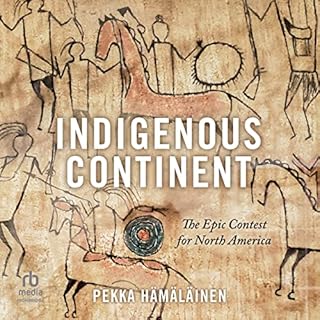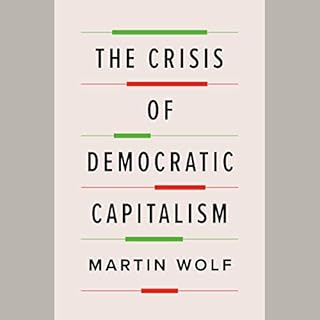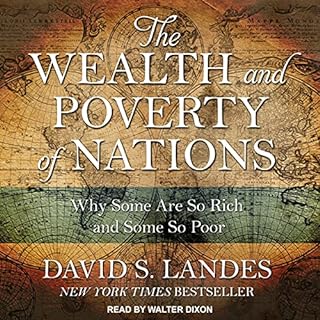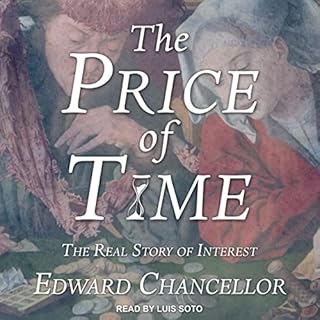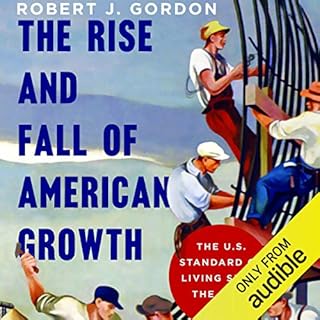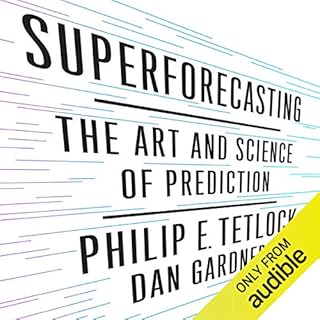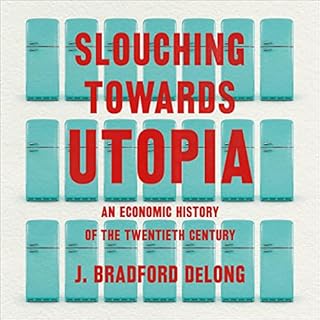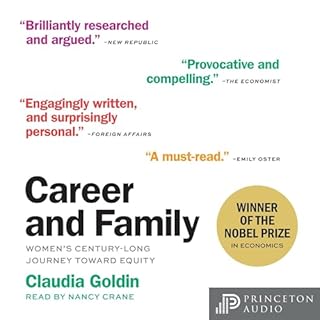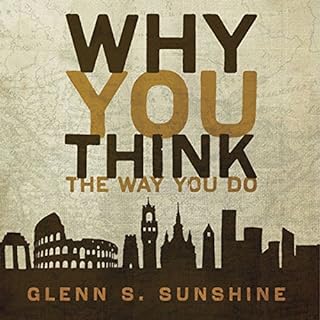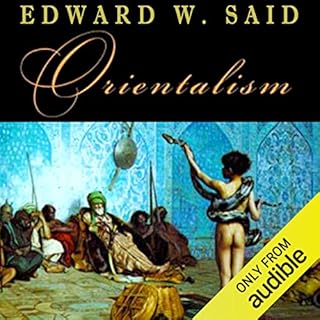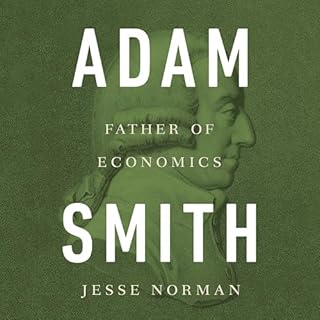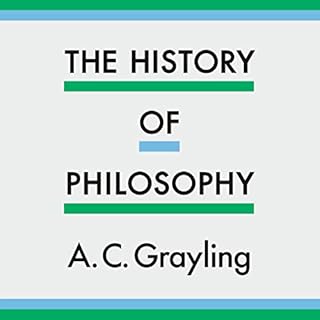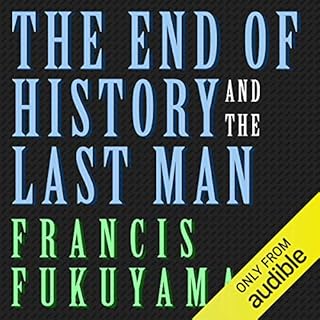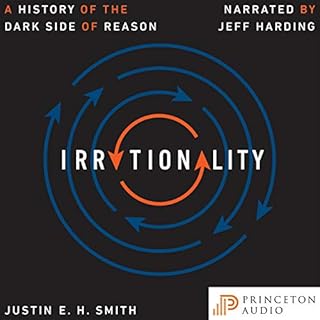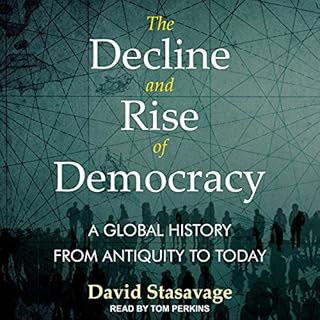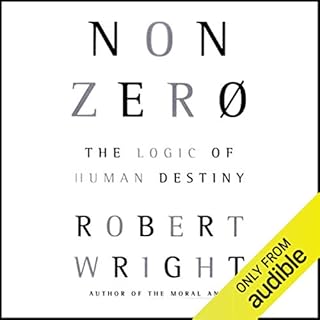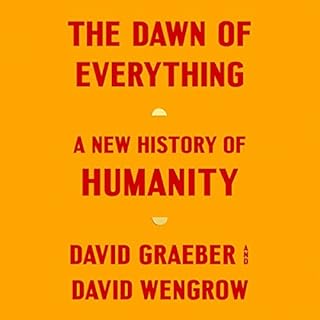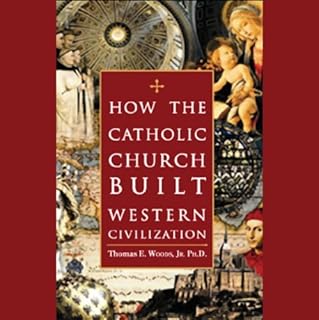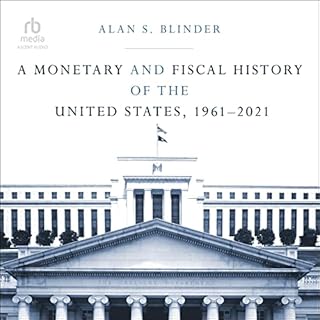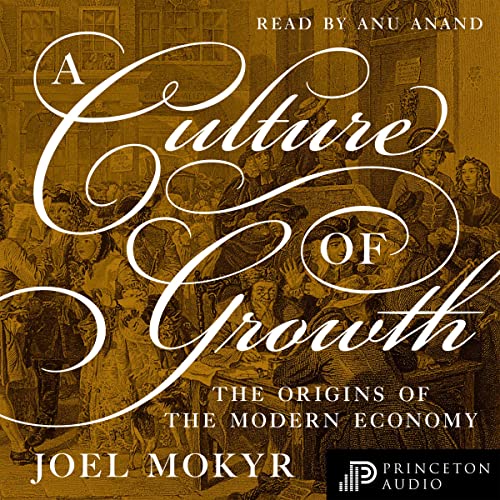
A Culture of Growth
The Origins of the Modern Economy
No se pudo agregar al carrito
Add to Cart failed.
Error al Agregar a Lista de Deseos.
Error al eliminar de la lista de deseos.
Error al añadir a tu biblioteca
Error al seguir el podcast
Error al dejar de seguir el podcast
 Exclusivo para miembros Prime: ¿Nuevo en Audible? Obtén 2 audiolibros gratis con tu prueba.
Exclusivo para miembros Prime: ¿Nuevo en Audible? Obtén 2 audiolibros gratis con tu prueba.Compra ahora por $20.24
No default payment method selected.
We are sorry. We are not allowed to sell this product with the selected payment method
-
Narrado por:
-
Anu Anand
-
De:
-
Joel Mokyr
Acerca de esta escucha
A classic book now available on audio
With narration by Anu Anand, who tells the story of how Enlightenment culture sparked the Industrial Revolution
During the late eighteenth century, innovations in Europe triggered the Industrial Revolution and the sustained economic progress that spread across the globe. While much has been made of the details of the Industrial Revolution, what remains a mystery is why it took place at all. Why did this revolution begin in the West and not elsewhere, and why did it continue, leading to today's unprecedented prosperity? In this groundbreaking book, celebrated economic historian Joel Mokyr argues that a culture of growth specific to early modern Europe and the European Enlightenment laid the foundations for the scientific advances and pioneering inventions that would instigate explosive technological and economic development. Bringing together economics, the history of science and technology, and models of cultural evolution, Mokyr demonstrates that culture—the beliefs, values, and preferences in society that are capable of changing behavior—was a deciding factor in societal transformations.
Mokyr looks at the period 1500-1700 to show that a politically fragmented Europe fostered a competitive "market for ideas" and a willingness to investigate the secrets of nature. At the same time, a transnational community of brilliant thinkers known as the “Republic of Letters” freely circulated and distributed ideas and writings. This political fragmentation and the supportive intellectual environment explain how the Industrial Revolution happened in Europe but not China, despite similar levels of technology and intellectual activity. In Europe, heterodox and creative thinkers could find sanctuary in other countries and spread their thinking across borders. In contrast, China’s version of the Enlightenment remained controlled by the ruling elite.
Combining ideas from economics and cultural evolution, A Culture of Growth provides startling reasons for why the foundations of our modern economy were laid in the mere two centuries between Columbus and Newton.
©2017 Princeton University Press (P)2023 Princeton University PressLos oyentes también disfrutaron...
-
How the World Became Rich
- The Historical Origins of Economic Growth
- De: Mark Koyama, Jared Rubin
- Narrado por: Adam Barr
- Duración: 10 h y 15 m
- Versión completa
-
General4.5 out of 5 stars 32
-
Narración:4.5 out of 5 stars 26
-
Historia4.5 out of 5 stars 26
Mark Koyama and Jared Rubin dive into the many theories of why modern economic growth happened when and where it did. They discuss recently advanced theories rooted in geography, politics, culture, demography, and colonialism. Pieces of each of these theories help explain key events on the path to modern riches. Why did the Industrial Revolution begin in eighteenth-century Britain? Why did some European countries, the United States, and Japan catch up in the nineteenth century? Why did it take until the late twentieth and twenty-first centuries for other countries?
-
5 out of 5 stars
-
Nice and insightful
- De Marina en 10-22-24
De: Mark Koyama, y otros
-
Power and Progress
- Our Thousand-Year Struggle over Technology and Prosperity
- De: Daron Acemoglu, Simon Johnson
- Narrado por: Malcolm Hillgartner
- Duración: 15 h y 50 m
- Versión completa
-
General4 out of 5 stars 85
-
Narración:4.5 out of 5 stars 75
-
Historia4 out of 5 stars 75
Throughout history, technological change — whether it takes the form of agricultural improvements in the Middle Ages, the Industrial Revolution, or today’s artificial intelligence — has been viewed as a main driver of prosperity, working in the public interest. The reality, though, is that technology is shaped by what powerful people want and believe, generating riches, social respect, cultural prominence, and further political voice for those already powerful. For most of the rest of us, there is the illusion of progress.
-
4 out of 5 stars
-
A different take on Technology’s impact
- De Ricardo Ernst en 07-23-23
De: Daron Acemoglu, y otros
-
The Capitalist Manifesto
- Why the Global Free Market Will Save the World
- De: Johan Norberg
- Narrado por: Mark Elstob
- Duración: 8 h y 53 m
- Versión completa
-
General4.5 out of 5 stars 104
-
Narración:4.5 out of 5 stars 93
-
Historia4.5 out of 5 stars 93
Marx and Engels were right when they observed in the Communist Manifesto that free markets had in a short time created greater prosperity and more technological innovation than all previous generations combined. A century and a half later, all the evidence shows that capitalism has lifted millions and millions from hunger and poverty. Today's story about global capitalism, shared by right-wing and left-wing populists, but also by large sections of the political and economic establishment, does not deny that prosperity has been created, but it says it ended up in far too few hands.
-
4 out of 5 stars
-
An unknown perspective
- De Salman Syed en 01-15-24
De: Johan Norberg
-
Indigenous Continent
- The Epic Contest for North America
- De: Pekka Hamalainen
- Narrado por: Kaipo Schwab
- Duración: 18 h y 44 m
- Versión completa
-
General4.5 out of 5 stars 123
-
Narración:4.5 out of 5 stars 108
-
Historia4.5 out of 5 stars 108
In Indigenous Continent, acclaimed historian Pekka Hämäläinen presents a sweeping counternarrative that shatters the most basic assumptions about American history. Shifting our perspective away from Jamestown, Plymouth Rock, the Revolution, and other well-trodden episodes on the conventional timeline, he depicts a sovereign world of Native nations whose members, far from helpless victims of colonial violence, dominated the continent for centuries after the first European arrivals.
-
4 out of 5 stars
-
indigenous Continent
- De katherine en 07-09-23
De: Pekka Hamalainen
-
The Crisis of Democratic Capitalism
- De: Martin Wolf
- Narrado por: John Lee
- Duración: 13 h y 17 m
- Versión completa
-
General4 out of 5 stars 31
-
Narración:4.5 out of 5 stars 28
-
Historia4 out of 5 stars 28
Martin Wolf has long been one of the wisest voices on global economic issues. He has rarely been called an optimist, yet he has never been as worried as he is today. Liberal democracy is in recession, and authoritarianism is on the rise. The ties that ought to bind open markets to free and fair elections are threatened, even in democracy’s heartlands, the United States and England.
-
1 out of 5 stars
-
Rambling and muddled.
- De Daniel Mccarty en 02-20-23
De: Martin Wolf
-
Economics in America
- An Immigrant Economist Explores the Land of Inequality
- De: Angus Deaton
- Narrado por: Angus Deaton
- Duración: 8 h y 38 m
- Versión completa
-
General4.5 out of 5 stars 18
-
Narración:4.5 out of 5 stars 18
-
Historia4.5 out of 5 stars 18
When economist Angus Deaton immigrated to the United States from Britain in the early 1980s, he was awed by America’s strengths and shocked by the extraordinary gaps he witnessed between people. Economics in America explains in clear terms how the field of economics addresses the most pressing issues of our times—from poverty, retirement, and the minimum wage to the ravages of the nation’s uniquely disastrous health care system—and narrates Deaton’s own account of his experiences as a naturalized US citizen and academic economist.
-
5 out of 5 stars
-
Perspective on interplay of economics and politics
- De JillT en 02-02-24
De: Angus Deaton
-
How the World Became Rich
- The Historical Origins of Economic Growth
- De: Mark Koyama, Jared Rubin
- Narrado por: Adam Barr
- Duración: 10 h y 15 m
- Versión completa
-
General4.5 out of 5 stars 32
-
Narración:4.5 out of 5 stars 26
-
Historia4.5 out of 5 stars 26
Mark Koyama and Jared Rubin dive into the many theories of why modern economic growth happened when and where it did. They discuss recently advanced theories rooted in geography, politics, culture, demography, and colonialism. Pieces of each of these theories help explain key events on the path to modern riches. Why did the Industrial Revolution begin in eighteenth-century Britain? Why did some European countries, the United States, and Japan catch up in the nineteenth century? Why did it take until the late twentieth and twenty-first centuries for other countries?
-
5 out of 5 stars
-
Nice and insightful
- De Marina en 10-22-24
De: Mark Koyama, y otros
-
Power and Progress
- Our Thousand-Year Struggle over Technology and Prosperity
- De: Daron Acemoglu, Simon Johnson
- Narrado por: Malcolm Hillgartner
- Duración: 15 h y 50 m
- Versión completa
-
General4 out of 5 stars 85
-
Narración:4.5 out of 5 stars 75
-
Historia4 out of 5 stars 75
Throughout history, technological change — whether it takes the form of agricultural improvements in the Middle Ages, the Industrial Revolution, or today’s artificial intelligence — has been viewed as a main driver of prosperity, working in the public interest. The reality, though, is that technology is shaped by what powerful people want and believe, generating riches, social respect, cultural prominence, and further political voice for those already powerful. For most of the rest of us, there is the illusion of progress.
-
4 out of 5 stars
-
A different take on Technology’s impact
- De Ricardo Ernst en 07-23-23
De: Daron Acemoglu, y otros
-
The Capitalist Manifesto
- Why the Global Free Market Will Save the World
- De: Johan Norberg
- Narrado por: Mark Elstob
- Duración: 8 h y 53 m
- Versión completa
-
General4.5 out of 5 stars 104
-
Narración:4.5 out of 5 stars 93
-
Historia4.5 out of 5 stars 93
Marx and Engels were right when they observed in the Communist Manifesto that free markets had in a short time created greater prosperity and more technological innovation than all previous generations combined. A century and a half later, all the evidence shows that capitalism has lifted millions and millions from hunger and poverty. Today's story about global capitalism, shared by right-wing and left-wing populists, but also by large sections of the political and economic establishment, does not deny that prosperity has been created, but it says it ended up in far too few hands.
-
4 out of 5 stars
-
An unknown perspective
- De Salman Syed en 01-15-24
De: Johan Norberg
-
Indigenous Continent
- The Epic Contest for North America
- De: Pekka Hamalainen
- Narrado por: Kaipo Schwab
- Duración: 18 h y 44 m
- Versión completa
-
General4.5 out of 5 stars 123
-
Narración:4.5 out of 5 stars 108
-
Historia4.5 out of 5 stars 108
In Indigenous Continent, acclaimed historian Pekka Hämäläinen presents a sweeping counternarrative that shatters the most basic assumptions about American history. Shifting our perspective away from Jamestown, Plymouth Rock, the Revolution, and other well-trodden episodes on the conventional timeline, he depicts a sovereign world of Native nations whose members, far from helpless victims of colonial violence, dominated the continent for centuries after the first European arrivals.
-
4 out of 5 stars
-
indigenous Continent
- De katherine en 07-09-23
De: Pekka Hamalainen
-
The Crisis of Democratic Capitalism
- De: Martin Wolf
- Narrado por: John Lee
- Duración: 13 h y 17 m
- Versión completa
-
General4 out of 5 stars 31
-
Narración:4.5 out of 5 stars 28
-
Historia4 out of 5 stars 28
Martin Wolf has long been one of the wisest voices on global economic issues. He has rarely been called an optimist, yet he has never been as worried as he is today. Liberal democracy is in recession, and authoritarianism is on the rise. The ties that ought to bind open markets to free and fair elections are threatened, even in democracy’s heartlands, the United States and England.
-
1 out of 5 stars
-
Rambling and muddled.
- De Daniel Mccarty en 02-20-23
De: Martin Wolf
-
Economics in America
- An Immigrant Economist Explores the Land of Inequality
- De: Angus Deaton
- Narrado por: Angus Deaton
- Duración: 8 h y 38 m
- Versión completa
-
General4.5 out of 5 stars 18
-
Narración:4.5 out of 5 stars 18
-
Historia4.5 out of 5 stars 18
When economist Angus Deaton immigrated to the United States from Britain in the early 1980s, he was awed by America’s strengths and shocked by the extraordinary gaps he witnessed between people. Economics in America explains in clear terms how the field of economics addresses the most pressing issues of our times—from poverty, retirement, and the minimum wage to the ravages of the nation’s uniquely disastrous health care system—and narrates Deaton’s own account of his experiences as a naturalized US citizen and academic economist.
-
5 out of 5 stars
-
Perspective on interplay of economics and politics
- De JillT en 02-02-24
De: Angus Deaton
-
Ours Was the Shining Future
- The Story of the American Dream
- De: David Leonhardt
- Narrado por: Dan John Miller
- Duración: 15 h y 52 m
- Versión completa
-
General4.5 out of 5 stars 47
-
Narración:4.5 out of 5 stars 43
-
Historia4.5 out of 5 stars 43
Two decades into the twenty-first century, the stagnation of living standards has become the defining trend of American life. Life expectancy has declined, economic inequality has soared, and, after some progress, the Black-white wage gap is once again as large as it was in the 1950s. How did this happen in the world’s most powerful country? And what happened to the “American dream”—the promise of a happier, healthier, more prosperous future—which was once such an inextricable part of our national identity?
-
5 out of 5 stars
-
A Little Heavy for my Commute
- De P. Scott en 12-13-23
De: David Leonhardt
-
The Wealth and Poverty of Nations
- Why Some Are So Rich and Some So Poor
- De: David S. Landes
- Narrado por: Walter Dixon
- Duración: 21 h y 47 m
- Versión completa
-
General4.5 out of 5 stars 55
-
Narración:4.5 out of 5 stars 47
-
Historia4.5 out of 5 stars 47
The Wealth and Poverty of Nations is David S. Landes' acclaimed, best-selling exploration of one of the most contentious and hotly debated questions of our time: Why do some nations achieve economic success while others remain mired in poverty? The answer, as Landes definitively illustrates, is a complex interplay of cultural mores and historical circumstance.
-
5 out of 5 stars
-
A detailed explanation
- De Kaarlis en 12-07-21
De: David S. Landes
-
Chip War
- The Quest to Dominate the World's Most Critical Technology
- De: Chris Miller
- Narrado por: Stephen Graybill
- Duración: 12 h y 38 m
- Versión completa
-
General5 out of 5 stars 2,319
-
Narración:4.5 out of 5 stars 1,968
-
Historia5 out of 5 stars 1,966
You may be surprised to learn that microchips are the new oil—the scarce resource on which the modern world depends. Today, military, economic, and geopolitical power are built on a foundation of computer chips. Virtually everything—from missiles to microwaves—runs on chips, including cars, smartphones, the stock market, even the electric grid. Until recently, America designed and built the fastest chips and maintained its lead as the #1 superpower, but America’s edge is in danger of slipping, undermined by players in Taiwan, Korea, and Europe taking over manufacturing.
-
5 out of 5 stars
-
Great history, but could poor narration
- De Lily Wong en 10-26-22
De: Chris Miller
-
The Price of Time
- The Real Story of Interest
- De: Edward Chancellor
- Narrado por: Luis Soto
- Duración: 15 h y 7 m
- Versión completa
-
General4.5 out of 5 stars 281
-
Narración:4.5 out of 5 stars 235
-
Historia4.5 out of 5 stars 235
In the beginning was the loan, and the loan carried interest. For at least five millennia people have been borrowing and lending at interest. Yet as capitalism became established from the late Middle Ages onwards, denunciations of interest were tempered because interest was a necessary reward for lenders to part with their capital. And interest performs many other vital functions: it encourages people to save; enables them to place a value on precious assets, such as houses and all manner of financial securities; and allows us to price risk.
-
5 out of 5 stars
-
Big landscape in time and subjects; Austrian view
- De Philo en 08-29-22
-
The Rise and Fall of American Growth
- The U.S. Standard of Living Since the Civil War
- De: Robert J. Gordon
- Narrado por: Michael Butler Murray
- Duración: 30 h y 14 m
- Versión completa
-
General4.5 out of 5 stars 519
-
Narración:4.5 out of 5 stars 429
-
Historia4.5 out of 5 stars 427
In the century after the Civil War, an economic revolution improved the American standard of living in ways previously unimaginable. Electric lighting, indoor plumbing, home appliances, motor vehicles, air travel, air conditioning, and television transformed households and workplaces. With medical advances, life expectancy between 1870 and 1970 grew from 45 to 72 years. The Rise and Fall of American Growth provides an in-depth account of this momentous era.
-
1 out of 5 stars
-
Over-detailed, with no engaging message
- De BehA en 01-31-17
De: Robert J. Gordon
-
The Origins of Political Order: From Prehuman Times to the French Revolution
- De: Francis Fukuyama
- Narrado por: Jonathan Davis
- Duración: 22 h y 34 m
- Versión completa
-
General4.5 out of 5 stars 2,913
-
Narración:4.5 out of 5 stars 2,488
-
Historia4.5 out of 5 stars 2,465
Virtually all human societies were once organized tribally, yet over time most developed new political institutions which included a central state that could keep the peace and uniform laws that applied to all citizens. Some went on to create governments that were accountable to their constituents. We take these institutions for granted, but they are absent or are unable to perform in many of today’s developing countries—with often disastrous consequences for the rest of the world.
-
3 out of 5 stars
-
Few forests, but lots of trees
- De Steve Pagano en 10-05-15
De: Francis Fukuyama
-
Superforecasting
- The Art and Science of Prediction
- De: Philip Tetlock, Dan Gardner
- Narrado por: Joel Richards
- Duración: 9 h y 45 m
- Versión completa
-
General4.5 out of 5 stars 4,809
-
Narración:4.5 out of 5 stars 4,070
-
Historia4.5 out of 5 stars 4,055
Everyone would benefit from seeing further into the future, whether buying stocks, crafting policy, launching a new product, or simply planning the week's meals. Unfortunately, people tend to be terrible forecasters. As Wharton professor Philip Tetlock showed in a landmark 2005 study, even experts' predictions are only slightly better than chance. However, an important and underreported conclusion of that study was that some experts do have real foresight.
-
5 out of 5 stars
-
Great for Experts
- De Michael en 02-20-17
De: Philip Tetlock, y otros
-
Slouching Towards Utopia
- An Economic History of the Twentieth Century
- De: J. Bradford DeLong
- Narrado por: Allan Aquino
- Duración: 20 h y 13 m
- Versión completa
-
General4 out of 5 stars 215
-
Narración:4.5 out of 5 stars 181
-
Historia4.5 out of 5 stars 181
Before 1870, humanity lived in dire poverty, with a slow crawl of invention offset by a growing population. Then came a great shift: invention sprinted forward, doubling our technological capabilities each generation and utterly transforming the economy again and again. Our ancestors would have presumed we would have used such powers to build utopia. But it was not so. When 1870-2010 ended, the world instead saw global warming; economic depression, uncertainty, and inequality; and broad rejection of the status quo.
-
4 out of 5 stars
-
A clear but sometimes one-sided economic history
- De Anon en 11-22-22
-
Revolutionary Spring
- Europe Aflame and the Fight for a New World, 1848-1849
- De: Christopher Clark
- Narrado por: Christopher Clark
- Duración: 33 h y 26 m
- Versión completa
-
General4.5 out of 5 stars 51
-
Narración:4.5 out of 5 stars 44
-
Historia4.5 out of 5 stars 44
As history, the uprisings of 1848 have long been overshadowed by the French Revolution of 1789 and the Russian revolutions of the early twentieth century. And yet in 1848 nearly all of Europe was aflame with conflict. Parallel political tumults spread like brush fire across the entire continent, leading to significant changes that continue to shape our world today. These battles for the future were fought with one eye kept squarely on the past. Revolutionary Spring is a new understanding of 1848 that offers chilling parallels to our present moment.
-
2 out of 5 stars
-
Like the revolutions, it got off to a good start
- De Anonymous User en 06-23-23
-
Career and Family
- Women’s Century-Long Journey Toward Equity
- De: Claudia Goldin
- Narrado por: Nancy Crane
- Duración: 9 h y 26 m
- Versión completa
-
General4.5 out of 5 stars 49
-
Narración:4.5 out of 5 stars 41
-
Historia4.5 out of 5 stars 41
A century ago, it was a given that a woman with a college degree had to choose between having a career and a family. Today, there are more female college graduates than ever before, and more women want to have a career and family, yet challenges persist at work and at home. This book traces how generations of women have responded to the problem of balancing career and family as the twentieth century experienced a sea change in gender equality, revealing why true equity for dual career couples remains frustratingly out of reach.
-
5 out of 5 stars
-
Very intelligent reading
- De Anonymous User en 07-06-24
De: Claudia Goldin
-
The Chile Project
- The Story of the Chicago Boys and the Downfall of Neoliberalism
- De: Sebastian Edwards
- Narrado por: Andrew Joseph Perez
- Duración: 9 h y 50 m
- Versión completa
-
General4.5 out of 5 stars 27
-
Narración:5 out of 5 stars 24
-
Historia4.5 out of 5 stars 24
In The Chile Project, Sebastian Edwards tells the story of how the neoliberal economic model came to an end in 2021, when Gabriel Boric was elected president, vowing that "If Chile was the cradle of neoliberalism, it will also be its grave." More than a story about one Latin American country, The Chile Project is a behind-the-scenes history of the spread and consequences of the free-market thinking that dominated economic policymaking around the world in the second half of the twentieth century—but is now on the retreat.
-
5 out of 5 stars
-
Combining history, ethnography, politic
- De John Murphy en 06-05-23
-
The Economic Weapon
- The Rise of Sanctions as a Tool of Modern War
- De: Nicholas Mulder
- Narrado por: Liam Gerrard
- Duración: 12 h y 25 m
- Versión completa
-
General4.5 out of 5 stars 109
-
Narración:4.5 out of 5 stars 82
-
Historia4.5 out of 5 stars 83
Economic sanctions dominate the landscape of world politics today. First developed in the early twentieth century as a way of exploiting the flows of globalization to defend liberal internationalism, their appeal is that they function as an alternative to war. This view, however, ignores the dark paradox at their core: designed to prevent war, economic sanctions are modeled on devastating techniques of warfare.
-
5 out of 5 stars
-
History of sanctions during the early 20th century
- De Mehdi Mollahasani en 03-05-22
De: Nicholas Mulder
Reseñas de la Crítica
"Co-Winner of the 2018 Allan Sharlin Memorial Award, Social Science History Association"
"Finalist for the 2017 Hayek Prize, The Manhattan Institute"
"Honorable Mention for the 2017 PROSE Award in European and World History, Association of American Publishers"
"One of MIT Technology Review’s Best Books of 2016"
"Fascinating.... [Mokyr] reminds us that the skirmishing of philosophers and their ideas, the preoccupation of popular historians, is in many ways a sideshow—that the revolution that gave Europe dominance was, above all, scientific, and that the scientific revolution was, above all, an artisanal revolution."—Adam Gopnik, New Yorker
"A fine book. . . . One of our country's great economic historians has helped us better understand the greatest transformation in human welfare our planet has ever seen."—Richard Vedder, Wall Street Journal
"Ultimately, without the impetus of science, economic growth would have fizzled out after 1815. A Culture of Growth is certainly making me rethink."—Brad DeLong, Nature
Relacionado con este tema
-
Why Trust Science?
- The University Center for Human Values, Book 1
- De: Naomi Oreskes
- Narrado por: John Chancer, Kelly Burke, Kerry Shale, y otros
- Duración: 8 h y 27 m
- Versión completa
-
General4.5 out of 5 stars 82
-
Narración:4.5 out of 5 stars 71
-
Historia4.5 out of 5 stars 71
Do doctors really know what they are talking about when they tell us vaccines are safe? Should we take climate experts at their word when they warn us about the perils of global warming? Why should we trust science when our own politicians don't? In this landmark book, Naomi Oreskes offers a bold and compelling defense of science, revealing why the social character of scientific knowledge is its greatest strength - and the greatest reason we can trust it.
-
5 out of 5 stars
-
Perfect Production of an Excellent Work
- De Andrew Mazibrada en 01-15-20
De: Naomi Oreskes
-
The Twilight of the American Enlightenment
- The 1950s and the Crisis of Liberal Belief
- De: George M. Marsden
- Narrado por: William Hughes
- Duración: 6 h y 24 m
- Versión completa
-
General4.5 out of 5 stars 114
-
Narración:4.5 out of 5 stars 91
-
Historia4.5 out of 5 stars 91
In the aftermath of World War II, the United States stood at a precipice. The forces of modernity unleashed by the war had led to astonishing advances in daily life, but technology and mass culture also threatened to erode the country's traditional moral character. As award-winning historian George M. Marsden explains in The Twilight of the American Enlightenment, postwar Americans looked to the country's secular liberalelites for guidance in this precarious time, but these intellectuals proved unable to articulate a coherent common cause by which America could chart its course.
-
4 out of 5 stars
-
Such a relevant book to our current world
- De Adam Shields en 09-14-16
-
Why You Think the Way You Do
- The Story of Western Worldviews from Rome to Home
- De: Glenn S. Sunshine
- Narrado por: Patrick Lawlor
- Duración: 8 h y 21 m
- Versión completa
-
General4.5 out of 5 stars 130
-
Narración:4.5 out of 5 stars 98
-
Historia4.5 out of 5 stars 96
Why You Think the Way You Do traces the development of the worldviews that underpin the Western world. Professor and historian Glenn S. Sunshine demonstrates the decisive impact that the growth of Christianity had in transforming the outlook of pagan Roman culture into one that—based on biblical concepts of humanity and its relationship with God—established virtually all the positive aspects of Western civilization.
-
2 out of 5 stars
-
"Christian's view of the western world"
- De Bradley en 03-21-10
-
Theory and History
- An Interpretation of Social and Economic Evolution (LvMI)
- De: Ludwig von Mises, Murray Rothbard
- Narrado por: John Pruden
- Duración: 10 h y 59 m
- Versión completa
-
General4.5 out of 5 stars 57
-
Narración:4.5 out of 5 stars 48
-
Historia4.5 out of 5 stars 47
Like F.A. Hayek, Ludwig von Mises moved beyond economics in his later years to address questions regarding the foundation of all social science. But unlike Hayek's attempts, Mises' writings on these matters have received less attention than they deserve. Theory and History, writes Rothbard in his introduction, "remains by far the most neglected masterwork of Mises". Here Mises defends his all-important idea of methodological dualism: one approach to the hard sciences and another for the social sciences.
-
5 out of 5 stars
-
Without This Book, You Are Uneducated
- De Michael D. Rubin en 10-03-18
De: Ludwig von Mises, y otros
-
Reason, Faith, and the Struggle for Western Civilization
- De: Samuel Gregg
- Narrado por: John McLain
- Duración: 6 h
- Versión completa
-
General4.5 out of 5 stars 158
-
Narración:4.5 out of 5 stars 142
-
Historia4.5 out of 5 stars 140
This sharp commentary on the rise and current decline of Western Civilization touches on historical moments - including the building of early universities in the Middle Ages and the American Revolution - and figures - including Augustine, Acquinas, Edmund Burke, and Adam Smith - that exemplify the faith-reason synthesis at the heart of Western Civilization, as well as the modern villains that threaten to destroy it.
-
5 out of 5 stars
-
Excellent description of the current state of the West
- De Terryn en 10-24-19
De: Samuel Gregg
-
Orientalism
- De: Edward Said
- Narrado por: Peter Ganim
- Duración: 19 h y 2 m
- Versión completa
-
General4.5 out of 5 stars 609
-
Narración:4.5 out of 5 stars 493
-
Historia4.5 out of 5 stars 494
This landmark book, first published in 1978, remains one of the most influential books in the Social Sciences, particularly Ethnic Studies and Postcolonialism. Said is best known for describing and critiquing "Orientalism", which he perceived as a constellation of false assumptions underlying Western attitudes toward the East. In Orientalism Said claimed a "subtle and persistent Eurocentric prejudice against Arabo-Islamic peoples and their culture."
-
5 out of 5 stars
-
We're lucky to have this on audio
- De Delano en 02-27-13
De: Edward Said
-
Why Trust Science?
- The University Center for Human Values, Book 1
- De: Naomi Oreskes
- Narrado por: John Chancer, Kelly Burke, Kerry Shale, y otros
- Duración: 8 h y 27 m
- Versión completa
-
General4.5 out of 5 stars 82
-
Narración:4.5 out of 5 stars 71
-
Historia4.5 out of 5 stars 71
Do doctors really know what they are talking about when they tell us vaccines are safe? Should we take climate experts at their word when they warn us about the perils of global warming? Why should we trust science when our own politicians don't? In this landmark book, Naomi Oreskes offers a bold and compelling defense of science, revealing why the social character of scientific knowledge is its greatest strength - and the greatest reason we can trust it.
-
5 out of 5 stars
-
Perfect Production of an Excellent Work
- De Andrew Mazibrada en 01-15-20
De: Naomi Oreskes
-
The Twilight of the American Enlightenment
- The 1950s and the Crisis of Liberal Belief
- De: George M. Marsden
- Narrado por: William Hughes
- Duración: 6 h y 24 m
- Versión completa
-
General4.5 out of 5 stars 114
-
Narración:4.5 out of 5 stars 91
-
Historia4.5 out of 5 stars 91
In the aftermath of World War II, the United States stood at a precipice. The forces of modernity unleashed by the war had led to astonishing advances in daily life, but technology and mass culture also threatened to erode the country's traditional moral character. As award-winning historian George M. Marsden explains in The Twilight of the American Enlightenment, postwar Americans looked to the country's secular liberalelites for guidance in this precarious time, but these intellectuals proved unable to articulate a coherent common cause by which America could chart its course.
-
4 out of 5 stars
-
Such a relevant book to our current world
- De Adam Shields en 09-14-16
-
Why You Think the Way You Do
- The Story of Western Worldviews from Rome to Home
- De: Glenn S. Sunshine
- Narrado por: Patrick Lawlor
- Duración: 8 h y 21 m
- Versión completa
-
General4.5 out of 5 stars 130
-
Narración:4.5 out of 5 stars 98
-
Historia4.5 out of 5 stars 96
Why You Think the Way You Do traces the development of the worldviews that underpin the Western world. Professor and historian Glenn S. Sunshine demonstrates the decisive impact that the growth of Christianity had in transforming the outlook of pagan Roman culture into one that—based on biblical concepts of humanity and its relationship with God—established virtually all the positive aspects of Western civilization.
-
2 out of 5 stars
-
"Christian's view of the western world"
- De Bradley en 03-21-10
-
Theory and History
- An Interpretation of Social and Economic Evolution (LvMI)
- De: Ludwig von Mises, Murray Rothbard
- Narrado por: John Pruden
- Duración: 10 h y 59 m
- Versión completa
-
General4.5 out of 5 stars 57
-
Narración:4.5 out of 5 stars 48
-
Historia4.5 out of 5 stars 47
Like F.A. Hayek, Ludwig von Mises moved beyond economics in his later years to address questions regarding the foundation of all social science. But unlike Hayek's attempts, Mises' writings on these matters have received less attention than they deserve. Theory and History, writes Rothbard in his introduction, "remains by far the most neglected masterwork of Mises". Here Mises defends his all-important idea of methodological dualism: one approach to the hard sciences and another for the social sciences.
-
5 out of 5 stars
-
Without This Book, You Are Uneducated
- De Michael D. Rubin en 10-03-18
De: Ludwig von Mises, y otros
-
Reason, Faith, and the Struggle for Western Civilization
- De: Samuel Gregg
- Narrado por: John McLain
- Duración: 6 h
- Versión completa
-
General4.5 out of 5 stars 158
-
Narración:4.5 out of 5 stars 142
-
Historia4.5 out of 5 stars 140
This sharp commentary on the rise and current decline of Western Civilization touches on historical moments - including the building of early universities in the Middle Ages and the American Revolution - and figures - including Augustine, Acquinas, Edmund Burke, and Adam Smith - that exemplify the faith-reason synthesis at the heart of Western Civilization, as well as the modern villains that threaten to destroy it.
-
5 out of 5 stars
-
Excellent description of the current state of the West
- De Terryn en 10-24-19
De: Samuel Gregg
-
Orientalism
- De: Edward Said
- Narrado por: Peter Ganim
- Duración: 19 h y 2 m
- Versión completa
-
General4.5 out of 5 stars 609
-
Narración:4.5 out of 5 stars 493
-
Historia4.5 out of 5 stars 494
This landmark book, first published in 1978, remains one of the most influential books in the Social Sciences, particularly Ethnic Studies and Postcolonialism. Said is best known for describing and critiquing "Orientalism", which he perceived as a constellation of false assumptions underlying Western attitudes toward the East. In Orientalism Said claimed a "subtle and persistent Eurocentric prejudice against Arabo-Islamic peoples and their culture."
-
5 out of 5 stars
-
We're lucky to have this on audio
- De Delano en 02-27-13
De: Edward Said
-
World-Systems Analysis: An Introduction
- A John Hope Franklin Center Book
- De: Immanuel Wallerstein
- Narrado por: Fred Filbrich
- Duración: 4 h y 32 m
- Versión completa
-
General4.5 out of 5 stars 100
-
Narración:4.5 out of 5 stars 79
-
Historia4.5 out of 5 stars 80
In World-Systems Analysis, Immanuel Wallerstein provides a concise and accessible introduction to the comprehensive approach that he pioneered 30 years ago to understanding the history and development of the modern world. Since Wallerstein first developed world-systems analysis, it has become a widely utilized methodology within the historical social sciences and a common point of reference in discussions of globalization.
-
3 out of 5 stars
-
Uneven, but Ambitious
- De Logical Paradox en 08-27-14
-
Giving the Devil His Due
- Reflections of a Scientific Humanist
- De: Michael Shermer
- Narrado por: Michael Shermer
- Duración: 13 h y 25 m
- Versión completa
-
General4.5 out of 5 stars 155
-
Narración:4 out of 5 stars 128
-
Historia4.5 out of 5 stars 125
Who is the "Devil"? And what is he due? The devil is anyone who disagrees with you. And what he is due is the right to speak his mind. He must have this for your own safety's sake, because his freedom is inextricably tied to your own. If he can be censored, why shouldn't you be censored? If we put barriers up to silence "unpleasant" ideas, what's to stop the silencing of any discussion? This book is a full-throated defense of free speech and open inquiry in politics, science, and culture by the New York Times best-selling author and skeptic Michael Shermer.
-
3 out of 5 stars
-
Flawed Audio
- De Private en 04-10-20
De: Michael Shermer
-
Adam Smith
- Father of Economics
- De: Jesse Norman
- Narrado por: Jesse Norman
- Duración: 13 h y 40 m
- Versión completa
-
General4.5 out of 5 stars 55
-
Narración:4.5 out of 5 stars 48
-
Historia4.5 out of 5 stars 48
A dazzlingly original account of the life and thought of Adam Smith, the greatest economist of all time. In Adam Smith, political philosopher Jesse Norman dispels the myths and caricatures, and provides a far more complex portrait of the man. Offering a highly engaging account of Smith's life and times, Norman explores his work as a whole and traces his influence over two centuries to the present day. Finally, he shows how a proper understanding of Smith can help us address the problems of modern capitalism.
-
5 out of 5 stars
-
Most excellent book!
- De Harish G. Naik en 03-02-19
De: Jesse Norman
-
The History of Philosophy
- De: A. C. Grayling
- Narrado por: Neil Gardner
- Duración: 28 h y 6 m
- Versión completa
-
General4.5 out of 5 stars 124
-
Narración:4.5 out of 5 stars 102
-
Historia4.5 out of 5 stars 101
The story of philosophy is an epic tale, spanning civilizations and continents. It explores some of the most creative minds in history. But not since the long-popular classic by Bertrand Russell, A History of Western Philosophy, published in 1945, has there been a comprehensive and entertaining single-volume history of this great, intellectual, world-shaping journey.
-
5 out of 5 stars
-
A much needed update to Bertrand Russell's classic
- De Michael en 06-27-20
De: A. C. Grayling
-
The End of History and the Last Man
- De: Francis Fukuyama
- Narrado por: L. J. Ganser
- Duración: 15 h y 51 m
- Versión completa
-
General4.5 out of 5 stars 355
-
Narración:4.5 out of 5 stars 289
-
Historia4.5 out of 5 stars 283
Ever since its first publication in 1992, The End of History and the Last Man has provoked controversy and debate. Francis Fukuyama's prescient analysis of religious fundamentalism, politics, scientific progress, ethical codes, and war is as essential for a world fighting fundamentalist terrorists as it was for the end of the Cold War. Now updated with a new afterword, The End of History and the Last Man is a modern classic.
-
5 out of 5 stars
-
An important discussion expertly narrated
- De Kevin Teeple en 06-27-19
De: Francis Fukuyama
-
Irrationality
- A History of the Dark Side of Reason
- De: Justin E. H. Smith
- Narrado por: Jeff Harding
- Duración: 13 h y 35 m
- Versión completa
-
General4.5 out of 5 stars 37
-
Narración:4.5 out of 5 stars 33
-
Historia4 out of 5 stars 33
Discovering that reason is the defining feature of our species, we named ourselves the “rational animal”. But is this flattering story itself rational? In this sweeping account of irrationality from antiquity to today - from the fifth-century BC murder of Hippasus for revealing the existence of irrational numbers to the rise of Twitter mobs and the election of Donald Trump - Justin Smith says the evidence suggests the opposite.
-
4 out of 5 stars
-
A good brain workout
- De ThomasC en 04-09-19
-
The Decline and Rise of Democracy
- A Global History from Antiquity to Today
- De: David Stastavage
- Narrado por: Tom Perkins
- Duración: 11 h y 34 m
- Versión completa
-
General4.5 out of 5 stars 50
-
Narración:4.5 out of 5 stars 32
-
Historia4.5 out of 5 stars 32
Historical accounts of democracy's rise tend to focus on ancient Greece and pre-Renaissance Europe. The Decline and Rise of Democracy draws from global evidence to show that the story is much richer - democratic practices were present in many places at many other times. David Stasavage makes the case that understanding how and where these democracies flourished - and when and why they declined - can provide crucial information not just about the history of governance, but about the ways modern democracies work and where they could manifest in the future.
-
5 out of 5 stars
-
Informative
- De Frank en 12-22-20
De: David Stastavage
-
Nonzero
- The Logic of Human Destiny
- De: Robert Wright
- Narrado por: Kevin T. Collins
- Duración: 16 h y 13 m
- Versión completa
-
General4 out of 5 stars 414
-
Narración:4.5 out of 5 stars 308
-
Historia4 out of 5 stars 308
At the beginning of Nonzero, Robert Wright sets out to "define the arrow of the history of life, from the primordial soup to the World Wide Web." Twenty-two chapters later, after a sweeping and vivid narrative of the human past, he has succeeded and has mounted a powerful challenge to the conventional view that evolution and human history are aimless.
-
2 out of 5 stars
-
Non-Zero (but pretty close to zero)
- De Douglas en 02-06-14
De: Robert Wright
-
The Dawn of Everything
- A New History of Humanity
- De: David Graeber, David Wengrow
- Narrado por: Mark Williams
- Duración: 24 h y 13 m
- Versión completa
-
General4.5 out of 5 stars 2,882
-
Narración:4.5 out of 5 stars 2,416
-
Historia4.5 out of 5 stars 2,405
A trailblazing account of human history, challenging our most fundamental assumptions about social evolution—from the development of agriculture and cities to the emergence of "the state", political violence, and social inequality—and revealing new possibilities for human emancipation.
-
5 out of 5 stars
-
exactly what I've been looking for
- De DankTurtle en 11-10-21
De: David Graeber, y otros
-
Anaximander
- And the Birth of Science
- De: Carlo Rovelli
- Narrado por: Roy McMillan
- Duración: 5 h y 42 m
- Versión completa
-
General4.5 out of 5 stars 77
-
Narración:4.5 out of 5 stars 63
-
Historia4.5 out of 5 stars 63
Over two millennia ago, the prescient insights of Anaximander paved the way for cosmology, physics, geography, meteorology, and biology, setting in motion a new way of seeing the world. His legacy includes the revolutionary ideas that the Earth floats in a void, that animals evolved, that the world can be understood in natural rather than supernatural terms, and that universal laws govern all phenomena. In this elegant work, the renowned theoretical physicist Carlo Rovelli brings to light the importance of Anaximander’s overlooked influence on modern science
-
4 out of 5 stars
-
Father of Science
- De Darwin8u en 10-31-24
De: Carlo Rovelli
-
How the Catholic Church Built Western Civilization
- De: Thomas E. Woods Jr.
- Narrado por: Barrett Whitener
- Duración: 7 h
- Versión completa
-
General4.5 out of 5 stars 1,285
-
Narración:4.5 out of 5 stars 1,029
-
Historia4.5 out of 5 stars 1,026
Western civilization has given us modern science, the wealth of free-market economics, the security of law, a sense of human rights and freedom, charity as a virtue, splendid art and music, philosophy grounded in reason, and innumerable other gifts we take for granted.
-
5 out of 5 stars
-
Fascinating and informative
- De Michael Kellogg en 09-29-05
-
Philosophy: 100 Essential Thinkers
- The Ideas That Have Shaped Our World
- De: Philip Stokes
- Narrado por: Steven Crossley
- Duración: 8 h y 12 m
- Versión completa
-
General4 out of 5 stars 114
-
Narración:4.5 out of 5 stars 93
-
Historia4 out of 5 stars 93
This engaging and accessible book invites the listener to explore the questions and arguments of philosophy through the work of 100 of the greatest thinkers within the Western intellectual tradition - covering philosophical, scientific, political, and religious thought over a period of 2500 years.
-
5 out of 5 stars
-
Unpretentious, honest, with a big picture
- De Mike S. en 05-29-17
De: Philip Stokes
Las personas que vieron esto también vieron...
-
The Wealth and Poverty of Nations
- Why Some Are So Rich and Some So Poor
- De: David S. Landes
- Narrado por: Walter Dixon
- Duración: 21 h y 47 m
- Versión completa
-
General4.5 out of 5 stars 55
-
Narración:4.5 out of 5 stars 47
-
Historia4.5 out of 5 stars 47
The Wealth and Poverty of Nations is David S. Landes' acclaimed, best-selling exploration of one of the most contentious and hotly debated questions of our time: Why do some nations achieve economic success while others remain mired in poverty? The answer, as Landes definitively illustrates, is a complex interplay of cultural mores and historical circumstance.
-
5 out of 5 stars
-
A detailed explanation
- De Kaarlis en 12-07-21
De: David S. Landes
-
How the World Became Rich
- The Historical Origins of Economic Growth
- De: Mark Koyama, Jared Rubin
- Narrado por: Adam Barr
- Duración: 10 h y 15 m
- Versión completa
-
General4.5 out of 5 stars 32
-
Narración:4.5 out of 5 stars 26
-
Historia4.5 out of 5 stars 26
Mark Koyama and Jared Rubin dive into the many theories of why modern economic growth happened when and where it did. They discuss recently advanced theories rooted in geography, politics, culture, demography, and colonialism. Pieces of each of these theories help explain key events on the path to modern riches. Why did the Industrial Revolution begin in eighteenth-century Britain? Why did some European countries, the United States, and Japan catch up in the nineteenth century? Why did it take until the late twentieth and twenty-first centuries for other countries?
-
5 out of 5 stars
-
Nice and insightful
- De Marina en 10-22-24
De: Mark Koyama, y otros
-
The Rise and Fall of American Growth
- The U.S. Standard of Living Since the Civil War
- De: Robert J. Gordon
- Narrado por: Michael Butler Murray
- Duración: 30 h y 14 m
- Versión completa
-
General4.5 out of 5 stars 519
-
Narración:4.5 out of 5 stars 429
-
Historia4.5 out of 5 stars 427
In the century after the Civil War, an economic revolution improved the American standard of living in ways previously unimaginable. Electric lighting, indoor plumbing, home appliances, motor vehicles, air travel, air conditioning, and television transformed households and workplaces. With medical advances, life expectancy between 1870 and 1970 grew from 45 to 72 years. The Rise and Fall of American Growth provides an in-depth account of this momentous era.
-
1 out of 5 stars
-
Over-detailed, with no engaging message
- De BehA en 01-31-17
De: Robert J. Gordon
-
Bourgeois Dignity
- Why Economics Can't Explain the Modern World
- De: Deirdre N. McCloskey
- Narrado por: Marguerite Gavin
- Duración: 20 h y 42 m
- Versión completa
-
General4.5 out of 5 stars 41
-
Narración:4.5 out of 5 stars 34
-
Historia4.5 out of 5 stars 35
According to McCloskey, our modern world was not the product of new markets and innovations but rather the result of shifting opinions about them. An utterly fascinating sequel to her critically acclaimed book The Bourgeois Virtues, Bourgeois Dignity is a feast of intellectual riches from one of our most spirited and ambitious historians - a work that will forever change our understanding of how the power of persuasion shapes our economic lives.
-
5 out of 5 stars
-
Everyone should understand economic growth
- De David Ahlstrom en 07-10-18
-
Slouching Towards Utopia
- An Economic History of the Twentieth Century
- De: J. Bradford DeLong
- Narrado por: Allan Aquino
- Duración: 20 h y 13 m
- Versión completa
-
General4 out of 5 stars 215
-
Narración:4.5 out of 5 stars 181
-
Historia4.5 out of 5 stars 181
Before 1870, humanity lived in dire poverty, with a slow crawl of invention offset by a growing population. Then came a great shift: invention sprinted forward, doubling our technological capabilities each generation and utterly transforming the economy again and again. Our ancestors would have presumed we would have used such powers to build utopia. But it was not so. When 1870-2010 ended, the world instead saw global warming; economic depression, uncertainty, and inequality; and broad rejection of the status quo.
-
4 out of 5 stars
-
A clear but sometimes one-sided economic history
- De Anon en 11-22-22
-
A Monetary and Fiscal History of the United States, 1961-2021
- De: Alan S. Blinder
- Narrado por: Todd McLaren
- Duración: 15 h y 12 m
- Versión completa
-
General4.5 out of 5 stars 71
-
Narración:4.5 out of 5 stars 59
-
Historia4.5 out of 5 stars 59
Alan Blinder, one of the world's most influential economists and one of the field's best writers, draws on his deep firsthand experience to provide an authoritative account of sixty years of monetary and fiscal policy in the United States. Spanning twelve presidents, from John F. Kennedy to Joe Biden, and eight Federal Reserve chairs, from William McChesney Martin to Jerome Powell, this is an insider's story of macroeconomic policy that hasn't been told before—one that is a pleasure to listen to, and as interesting as it is important.
-
3 out of 5 stars
-
Listen for Nixon's Sake
- De Tricia en 10-26-22
De: Alan S. Blinder
-
The Wealth and Poverty of Nations
- Why Some Are So Rich and Some So Poor
- De: David S. Landes
- Narrado por: Walter Dixon
- Duración: 21 h y 47 m
- Versión completa
-
General4.5 out of 5 stars 55
-
Narración:4.5 out of 5 stars 47
-
Historia4.5 out of 5 stars 47
The Wealth and Poverty of Nations is David S. Landes' acclaimed, best-selling exploration of one of the most contentious and hotly debated questions of our time: Why do some nations achieve economic success while others remain mired in poverty? The answer, as Landes definitively illustrates, is a complex interplay of cultural mores and historical circumstance.
-
5 out of 5 stars
-
A detailed explanation
- De Kaarlis en 12-07-21
De: David S. Landes
-
How the World Became Rich
- The Historical Origins of Economic Growth
- De: Mark Koyama, Jared Rubin
- Narrado por: Adam Barr
- Duración: 10 h y 15 m
- Versión completa
-
General4.5 out of 5 stars 32
-
Narración:4.5 out of 5 stars 26
-
Historia4.5 out of 5 stars 26
Mark Koyama and Jared Rubin dive into the many theories of why modern economic growth happened when and where it did. They discuss recently advanced theories rooted in geography, politics, culture, demography, and colonialism. Pieces of each of these theories help explain key events on the path to modern riches. Why did the Industrial Revolution begin in eighteenth-century Britain? Why did some European countries, the United States, and Japan catch up in the nineteenth century? Why did it take until the late twentieth and twenty-first centuries for other countries?
-
5 out of 5 stars
-
Nice and insightful
- De Marina en 10-22-24
De: Mark Koyama, y otros
-
The Rise and Fall of American Growth
- The U.S. Standard of Living Since the Civil War
- De: Robert J. Gordon
- Narrado por: Michael Butler Murray
- Duración: 30 h y 14 m
- Versión completa
-
General4.5 out of 5 stars 519
-
Narración:4.5 out of 5 stars 429
-
Historia4.5 out of 5 stars 427
In the century after the Civil War, an economic revolution improved the American standard of living in ways previously unimaginable. Electric lighting, indoor plumbing, home appliances, motor vehicles, air travel, air conditioning, and television transformed households and workplaces. With medical advances, life expectancy between 1870 and 1970 grew from 45 to 72 years. The Rise and Fall of American Growth provides an in-depth account of this momentous era.
-
1 out of 5 stars
-
Over-detailed, with no engaging message
- De BehA en 01-31-17
De: Robert J. Gordon
-
Bourgeois Dignity
- Why Economics Can't Explain the Modern World
- De: Deirdre N. McCloskey
- Narrado por: Marguerite Gavin
- Duración: 20 h y 42 m
- Versión completa
-
General4.5 out of 5 stars 41
-
Narración:4.5 out of 5 stars 34
-
Historia4.5 out of 5 stars 35
According to McCloskey, our modern world was not the product of new markets and innovations but rather the result of shifting opinions about them. An utterly fascinating sequel to her critically acclaimed book The Bourgeois Virtues, Bourgeois Dignity is a feast of intellectual riches from one of our most spirited and ambitious historians - a work that will forever change our understanding of how the power of persuasion shapes our economic lives.
-
5 out of 5 stars
-
Everyone should understand economic growth
- De David Ahlstrom en 07-10-18
-
Slouching Towards Utopia
- An Economic History of the Twentieth Century
- De: J. Bradford DeLong
- Narrado por: Allan Aquino
- Duración: 20 h y 13 m
- Versión completa
-
General4 out of 5 stars 215
-
Narración:4.5 out of 5 stars 181
-
Historia4.5 out of 5 stars 181
Before 1870, humanity lived in dire poverty, with a slow crawl of invention offset by a growing population. Then came a great shift: invention sprinted forward, doubling our technological capabilities each generation and utterly transforming the economy again and again. Our ancestors would have presumed we would have used such powers to build utopia. But it was not so. When 1870-2010 ended, the world instead saw global warming; economic depression, uncertainty, and inequality; and broad rejection of the status quo.
-
4 out of 5 stars
-
A clear but sometimes one-sided economic history
- De Anon en 11-22-22
-
A Monetary and Fiscal History of the United States, 1961-2021
- De: Alan S. Blinder
- Narrado por: Todd McLaren
- Duración: 15 h y 12 m
- Versión completa
-
General4.5 out of 5 stars 71
-
Narración:4.5 out of 5 stars 59
-
Historia4.5 out of 5 stars 59
Alan Blinder, one of the world's most influential economists and one of the field's best writers, draws on his deep firsthand experience to provide an authoritative account of sixty years of monetary and fiscal policy in the United States. Spanning twelve presidents, from John F. Kennedy to Joe Biden, and eight Federal Reserve chairs, from William McChesney Martin to Jerome Powell, this is an insider's story of macroeconomic policy that hasn't been told before—one that is a pleasure to listen to, and as interesting as it is important.
-
3 out of 5 stars
-
Listen for Nixon's Sake
- De Tricia en 10-26-22
De: Alan S. Blinder






